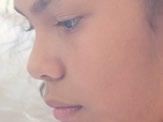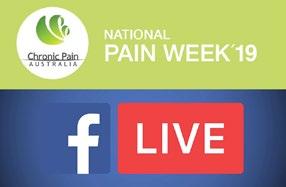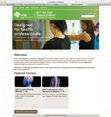AUSTRALIAN PAIN SOCIETY NEWSLETTER



Where does the time go? It is staggering to think that this is the second last eNewsletter for the year! It seems like only yesterday we were all on the Gold Coast for the 39th Annual Scientific Meeting, yet now preparations are in full swing for the 40th Annual Scientific Meeting in Hobart next year (April 5th-8th, 2020). Registrations are now open, make sure you take advantage of the early bird pricing!
This month’s eNewsletter kicks off with Joshua Pate providing a great overview of his experiences in the PhD Scholar position on the Scientific Program Committee (SPC) over the last 12 months. I would like to thank Josh for his contributions to the SPC while balancing his PhD studies and clinical work and am excited to hear that Josh has been invited to join the SPC in an ongoing role.
President-Elect Trudy Maunsell provides two valuable reports on important Society activities. The first is a summary of the discipline subgroup meetings from this year’s Annual Scientific Meeting on the Gold Coast. These meetings provide an opportunity for members to discuss issues relevant to the Society and I am sure the Board is very appreciative of the feedback and suggestions provided. The second provides an overview of the Society’s involvement in a government review of nursing education in Australia. Keep and eye out for the final report and recommendations when it is released by the Department of Health.
Benjamin Graham describes the success of a Facebook Live event held for National Pain Week earlier this year. An initiative of Chronic Pain Australia, National Pain Week aims to raise awareness of the experiences of those individuals living with chronic pain as well as promoting pain management strategies. The video has been streamed more than 1,300 times since the event and is still available on the Chronic Pain Australia Facebook page if you are interested in checking it out.
Katherine Brain and colleagues advise on nutritional considerations for Indigenous Australians, John Quintner highlights a recent paper on the misnomer that is congenital insensitivity to pain, and Andrew Somogyi reports on the Broadfoot Trust Prize from the New Zealand Pain Society. These are all great contributions to the eNewsletter and I encourage all members to not shy away from sharing your knowledge, research, and other news with the broader Society.
Finally, membership renewal notices will be sent out via email towards the end of the month. Note that the Board has resolved an increase in the cost of membership for 2020. However, the price increase is reasonable and still provides great value for money for members. Be sure to review and update your member profile online!
Lincoln Tracy, Assistant EditorI have just completed my year in the SPC Scholar role for the APS. What a great opportunity it has been to connect and collaborate with leaders in our field.
When I joined in November 2018 I was excited, but I didn’t really know what I was getting into. It has been excellent to see the behind-the-scenes of all the work that goes into running what I think is a fantastic conference.

So, what is involved in the role? The main commitment of the role is a monthly 90-minute teleconference with the committee, organising the
next conference. The day before the conference, the SPC have a face-to-face meeting to begin planning the following year’s conference. One of my highlights has been seeing how new ideas for different sessions develop throughout the year as we plan and discuss them.
I was initially surprised at just how much work goes into organising our APS ASM each year. I think that the APS is doing an excellent job engaging and supporting Early Career Researchers in this process.
I have learnt skills being in the SPC that have extended into other aspects of
my professional life. For example, by observing very efficient people working very efficiently in time-restricted meetings, I have since streamlined my fortnightly PhD supervisory meetings. I must admit that I do have a bias toward maximising efficiency, so this role has been a satisfying learning experience in that regard.
In summary, being in the APS SPC Scholar role has led to many opportunities, and it is one of those you-get-out-what-you-put-in roles. I feel that it compliments my clinical and research roles very well.
I am delighted to announce that the 2020 PhD Scholar Position has been awarded to Emre Ilhan from Macquarie University. Emre’s PhD research area is in neonatal and infant pain and we look forward to having him involved in the SPC. I am also pleased to have been invited to become a permanent member of the SPC! I look forward to continue working with and learning from the SPC.
Joshua is now finalising his PhD on paediatric pain at Macquarie University whilst continuing part-time clinical work.
Declaration: Joshua W. Pate’s research is funded by a Macquarie University Research Training Program (RTP) PhD scholarship. Nil conflicts of interest.
 JOSHUA PATE
JOSHUA PATE
Joshua’s PhD at Macquarie University is wrapping up at the end of this year. It is an investigation into a child’s concept of pain: how a child thinks about pain. He is also a senior physiotherapist at Westmead Hospital Pain Management Centre. You can contact him at joshua.pate@mq.edu.au or on Twitter @JoshuaWPate.
Get in early and secure your place at Australia’s only multidisciplinary conference offering insights into the complex nature of pain management from a variety of medical, nursing, and allied health perspectives.

To register please click here!
Considering the benefits of your membership?
Save on your APS 2020 registration fee!
Early Bird
Before 19 February 2020
Non-Member Registration Price VS Becoming an APS Member
APS Student Member
Registration Price
$1,140 OR
Being a member saves you up to $280 after membership fees!
Only $230
Being a member saves you $850 after membership fees!
Colleagues interested in becoming members and saving on their registrations too?
Tell them to become an APS Member and start saving right away!
We look forward to welcoming you to Hobart, Tasmania.
Should you have queries, please contact the Conference Secretariat.
2020 will bring us more challenges in the IASP Global Year for the Prevention of Pain.

You can look forward to an extensive program including pre-conference workshops, international keynote speakers, national speakers, and topical sessions. Follow the links to start planning your conference experience today!
Program Overview
Keynote Speakers
Pre-Conference Workshops
Social Program
Discipline Sub-Group Meetings
Topical Concurrent Workshops
Sponsored Sessions
Trainee Session
For information on APS 2020 visit the website
We look forward to welcoming you to Hobart, Tasmania!

 BY KATHERINE BRAIN, KERITH
BY KATHERINE BRAIN, KERITH

Katherine is an Accredited Practising Dietitian and Research Academic in Nutrition & Dietetics at the University of Newcastle. Kerith is an Accredited Practising Dietitian and Postdoctoral Research Fellow at the University of Newcastle. Laura is an APA Titled Pain Physiotherapist who works with Hunter Integrated Pain Service and involved in running a brief pain management program for CALD populations in the Hunter. Prof Clare Collins is a Fellow of the Dietitians Association of Australia and Senior Research Fellow in Nutrition & Dietetics in the Faculty of Health and Medicine at the University of Newcastle.
Indigenous Australians are 1.5 times more likely to have osteoarthritis and 25% more likely to have lower back pain compared to non-Indigenous Australians1. Overall, Indigenous Australians experience burden of disease 2.3 times that of non-Indigenous Australians1. Almost 40% of this burden is preventable by reducing exposure to modifiable risk factors such as dietary intake1, and were not reported in Australia prior to colonisation.

The Agency for Clinician Innovation website, Our Mob, displays an Indigenous artwork which incorporates key messages for chronic pain (Figure 1)2. Healthy food, bush tucker, and fresh food is represented in the centre of the artwork, highlighting the importance of nutrition2.

1. Biomedical: Health goes beyond physical wellbeing and includes social, emotional, spiritual, and the cultural wellbeing for the whole community3,4. It encompasses a holistic approach3,4. In contrast, the contemporary health care system largely focuses on the clinical aspect. There can be a sense of loss of traditional holistic wellbeing leading to an increase burden from chronic disease3,4.
2. Mindbody: Traditionally Indigenous people focus on social and emotional wellbeing with emphasis on spiritual health and dreamtime3,4. However, the contemporary way of addressing mindbody issues is to focus on mental health problems, rather than what influences the problem. There is also a
huge sense of discrimination, grief, and loss which increases the prevalence of mental health issues3,4
3. Connection: Connection to family, community, spirituality and to the land which is extremely important but has been taken away through history (e.g. stolen generation)3,4. This loss of connection has isolated Indigenous people from their traditional foods and way of eating. The loss of connection can lead to increases in trauma, which in turn, can lead to worsened pain experiences.
4. Physical activity: Traditionally Indigenous people see physical activity as moving with purpose, team games, and dance whereas non-Indigenous people see it as exercise and sport5. Different meanings can reduce the emphasis on
movement, leading to a more sedentary lifestyle where hunting and gathering for food is no longer needed5
5. Nutrition: Indigenous Australians value food, especially nutrient rich food and their way of eating is to graze and share food, ensuring sustainable practices5. From a health professional perspective, non-Indigenous Australians focus more on nutrition and energy balance, and are more likely to be health orientated when it comes to food5. Modern eating patterns have also led to increased availability of energy-dense nutrition-poor foods.
In order to show that a traditional diet can align with Australian Dietary Guidelines, the ‘Nutraditions’ project was undertaken in the Worimi and Biripi nations located in the Mid-North Coast in NSW5. Aboriginal Elders and knowledge keepers collaborated with local nutritionists to match traditional foods with contemporary options; for example, from a nutrition perspective, Warrigal greens are similar to Chinese cabbage and the Bogong moth is similar to pumpkin seeds5. Contemporary alternatives were also incorporated into the traditional meal pattern of one main meal, one small meal, and grazing foods.
This project empowered elders, retained Indigenous knowledge, motivated Indigenous people to change eating habits, increased pride and culture, and generated interest in and respect for traditional foods and diets from non-Aboriginal people5.
The best way to address Indigenous health issues is to combine the expertise from Indigenous elders, Aboriginal health workers, and Indigenous communities with clinicians, evidence, researchers and government. By empowering Indigenous people there will be greater successes and better outcomes.
When communicating with Indigenous clients be aware, understand, and respect the differences in culture. Collaborate with Aboriginal people at every stage, be mindful of white privilege, aim to increase your cultural awareness and competence, use appropriate language, and seek to understand. Be aware that the emphasis of time varies between Indigenous and nonIndigenous cultures and that silences are considered normal and valued. Use a ‘yarn’ style of communicating focusing around conversation and story based.
Resources
• Agency for Clinical Innovation: https://www.aci.health.nsw.gov.au/ chronic-pain/our-mob
• Australian Pain Society: https://www. apsoc.org.au/Indigenous-Resources
• Dietitians Association of Australia: https://daa.asn.au/smart-eatingfor-you/smart-eating-fast-facts/ healthy-eating/health-and-wellbeingof-aboriginal-and-torres-strait-islanderpeople/
• Queensland Health: https://www. health.qld.gov.au/data/assets/pdf_ file/0021/151923/communicating.pdf
The authors would like to acknowledge and thank the Indigenous elders and Accredited Practicing Dietitians who made Nutraditions possible.
1. AIHW 2018. Australia’s health 2018. Australia’s health series no. 16. AUS 221. Canberra: AIHW.
2. ACI. Out Mob. Available from: https:// www.aci.health.nsw.gov.au/chronic-pain/ our-mob
3. Gee, G et al. (2014). Aboriginal and Torres Strait Islander social and emotional wellbeing. In Dudgeon, P et al. (Ed.), Working together: Aboriginal and Torres Strait Islander mental health and wellbeing principles and practice (2nd ed., pp. 55-68).

4. Australian Department of Health and Ageing. (2013). National Aboriginal and Torres Strait Islander Health Plan 2013-2023.


5. Duncanson, K et al. (2014). Nutraditions: Does a traditional worimi diet achieve the current Australian dietary guidelines? JNIM. 1. 28.
Declarations
• Katherine Brain was supported by an Australian Postgraduate Award and Hunter Medical Research Top Up Scholarship during her PhD (2015-2018).

• Kerith Duncanson has nothing to declare.
• Laura Bruggink has nothing to declare.
• Professor Clare Collins is a NHMRC Senior Research fellow (2016-2020) and a Gladys M Brawn Senior Research Fellow in the Faculty of Health and Medicine at the University of Newcastle.
The Australian Pain Society (APS) Board introduced Disciple Sub-group forums following pre-conference workshops at the Annual Scientific Meeting (ASM) in Hobart in 2014, an initiative to foster communication from the membership to the board and to encourage participation in the Society. Our sixth subgroup forum meetings took place on Sunday April 7, 2019 at the Gold Coast Convention and Exhibition Centre with 106 attendees and 14 facilitators resisting the lure of the beach, Gold Coast hinterland, and golf courses
The discipline sub groups meetings were facilitated by an APS board member with groups representing medicine, occupational therapy, physiotherapy, psychology, and nursing. Six key domains - APS activity over the past 12 months / ASM research, clinical care, advocacy, education, and future endeavours were slated for discussion but not all topics were discussed in all sessions.
The following points were raised and discussed by attendees (in no particular order):
• The ASM is seen as being a useful conference with a broad mix of speakers from different disciplines but it was felt that more GPs needed to be attracted to attend.
• Many people were not aware of the APS Facebook page and the private group. Some were keen to try it, some never use it, others consider it more relevant for younger members / concerned about privacy.
• Suggestion of an “Agony Aunt” style column in the APS newsletter to enable people to submit questions / request and to be contacted back by any other APS member who may have advice or suggestions.
• Need to educate all on the role of different disciplines (OT, physios, psychologists, pharmacists, nurses) in multidisciplinary teams and that these roles be supported by the APS.
• Credentialing of different specialties in pain management.
• That APS needs to have an independent voice and make submissions to government, not just Painaustralia.
• Suggestion to include a consumer stream as part of the society and potentially as a part of the scientific meeting.
• The need for a more intuitive website.
• Career opportunities in pain management within Pharmacy.
• The need for collaboration with dentists and oral health therapists.
• The development of a position statement between Pharmaceutical Society of Australia, the Society of Hospital Pharmacists Australia, and the APS.
• Shorten the newsletter; include more physio topics; too medically focused.
• Helpful inclusions in the newsletter are opioid prescribing articles, Global Year against pain updates, the editorial, links to articles, synopsis of literature.
• Preconference workshops “silos” of disciplines and suggestion to advertise that all disciplines welcome to attend any workshop.
• Electronic Persistent Pain Outcomes Collaboration workshop suggested.
• Review of Medicare item numbers for allied health (physios, pharmacists).
• Clinical attachment grants.
• Clinical practice not being reflected in research.
• APS to advocate for different roles in pain management e.g. physios, pharmacists, psychologists, nurses.
• How can the APS increase nursing input into the APS?
• Target universities, Chief Nurses, AHPRA, FPM to improve pain management education.
Suggestions for future speakers / topics included:
• Dan Seigl – Professor of Psychology / Psychiatry with a focus on trauma / repressed emotions / resilience.
• The transition of paediatric patients with chronic pain to adult pain management and how to navigate the transition from paediatric to adult management.
• A speaker from TGA for example, to outline the processes that occur at government and policy level regarding medications legislation and policy.
• Promotion of the role of the occupational therapist in multidisciplinary teams.
• An update on the NDIS and APS involvement in it.
• Acute and chronic pain management in dental health.
• Cannabis debate – the pros and cons.
• Migraine treatment, especially CGRP injections.
• Suicide risk in chronic pain and how to provide mental health first aid.
• Neurodynamics entrapment neuropathy by Melana Schmidt.
• Greg Lamb (Physio).
• Speaker from the last APS conference (Siobhan).
• Anton Rogers (physio).
Thank you to all who attended and contributed to discussions. The APS board and the Scientific Organising Committee value your thoughts and suggestions. Don’t forget to come to Hobart in 2020 and bring a friend!
Weisman A, Quintner J, Masharawi
Y. Congenital insensitivity to pain: a misnomer. J Pain 2019; 20(9): 1011-1014.
Published on-line February 2. DOI: https:// doi.org/10.1016/j.jpain.2019.01.331
Congenital insensitivity to pain is an umbrella term used to describe a group of rare genetic diseases also classified as hereditary sensory autonomic neuropathies.
These conditions are intriguing, with the potential to shed light on the poorly understood relationship concerning nociception and the experience of pain.
However, the term congenital insensitivity to pain is epistemologically incorrect and is the product of historical circumstances. The term conflates pain and nociception and, thus, prevents researchers and caregivers from grasping the full dimensions of these conditions.
The aims of this article were to review the epistemological problems surrounding
the term, to demonstrate why the term is inaccurate, and to suggest a new term, namely, congenital nociceptor deficiency.
The suggested term better reflects the nature of the conditions and incorporates current understandings of nociception.
Perspective: The umbrella term congenital insensitivity to pain conflates pain and nociception, which is epistemologically unacceptable. We suggest a new term, namely, congenital nociceptor deficiency, that overcomes this problem and is concordant with current neurobiological knowledge.
Declaration: The authors have nothing to declare.
Reminder that we are keen that members inform us when they have publications so that this can be shared with your APS colleagues.
Please send the newsletter editor (via the APS Secretariat, aps@apsoc.org.au) the title, authors and reference (i.e. the journal, volume etc.) of the article, preferably with a short explanatory note to give our readers the gist of the article, e.g. the conclusions part of the abstract; if you would like to supply a short commentary on the article, even better.


These newly renamed and expanded grants are available to Nursing, Allied Health Professionals and Trainee/Early Career Researchers.
The Clinical Professional Connection Grant is designed to support APS members in the following ways:
• Nursing or allied health clinicians from non-metropolitan locations to visit a major metropolitan multidisciplinary pain centre, for the duration of generally one (1) week. Visits are intended to support professional learning (including the exploration of new models of care) that can inform service development in non-metropolitan services with single or limited discipline profiles;
• Trainee/early career researchers (i.e., researchers currently undertaking their PhD, or within five years of PhD conferral) to visit a major metropolitan multidisciplinary pain centre for the purpose of conducting/initiating a clinically-oriented research project that involves the development of a new partnership/collaboration with allied health, nursing or medical pain specialists. Projects can use basic science or applied methods, but the clinical relevance of the project must be clearly articulated.
See website for Eligibility Criteria, Terms and Conditions, and application form.
The 2019 Broadfoot Trust Prize for Outstanding Pain Research from the New Zealand Pain Society was awarded to a trans-Tasman collaboration between Andrew Somogyi and Daniel Barratt (University of Adelaide) and, David Rice (first author), Peter McNair, Gwyn Lewis, Robert Borotkanics (Auckland University of Technology), Michal Kluger (Department of Anaesthesiology and Perioperative Medicine) and Matthew Walker (Department of Orthopaedic Surgery) both from the Waitema District Health Board) for their paper “Predictors of persistent postsurgical pain after total knee arthroplasty: A prospective study” published in the British Journal of Anaesthesia 121(4), 804-812, 2018 (doi: 10.1016/j/bja.2018.05.070). Many previous studies were retrospective in nature or only considered a small number of preoperative variables, whereas this study in 300 New Zealand patients undergoing primary unilateral TKA studied a large number of psychological, neurophysiological, genetic, clinical and surgical factors. The prevalence of moderate to severe persistent postsurgical pain was found to be 21% (6 months) and 16%(12 months) after surgery, with more than 50% having likely neuropathic pain. Preoperative pain intensity, expected pain, trait anxiety, and temporal summation were the major factors identified. The study was funded by grants from the Australia and New Zealand College of Anaesthetists and the Auckland University of Technology.
Declaration: The Author has nothing to declare Professor in Clinical and Experimental Pharmacology at the University of Adelaide whose research involves the clinical pharmacology including pharmacogenomics of acute and chronic pain treatments. Andrew delivered the Bonica Lecture at the 2017 APS meeting in Adelaide.

The Australian Government Department of Health recently conducted a review of nursing education in Australia and interested groups were invited to provide feedback in writing and / or to attend consultation workshops health throughout Australia. The Australian Pain Society chose to provide feedback via a written submission and to attend the Brisbane Consultation workshop on June 24, 2019. Feedback for the written submission was provided by Debbie Wallace, Chair, Pain Interest Group (Nursing Issues) and other representatives on the Relationships Committee of the Australian Pain Society (with thanks). A total of 83 written submissions were received by the reviewers and have been published on the following site https://consultations.health.gov.au/ office-of-the-chief-nursing-and-midwiferyofficer/educating-the-nurse-of-the-futureindependent-revi-1/
The Brisbane workshop was facilitated by Emeritus Professor Steven Schwartz, AM Senior Fellow for the Centre for Independent Studies and who is a past chair of the Australian Curriculum, Assessment and Advisory Authority and a Board member of Teach Australia. He has conducted a number of reviews of education services and was selected as an independent reviewer.
The Brisbane event was well attended with representation from many passionate stakeholders including the University sector, TAFE, public and private hospitals, private nurse education companies,
nursing unions and many specialist groups including Indigenous health services, drug and alcohol, mental health, practice nurses, community nursing services, and prison health services. There was vigorous debate on several topics including the variance in university curricula, whether or not there should be a return to Statewide examinations, extended roles especially for advanced practice nurses including Enrolled Nurses and Nurse Practitioners, who are responsible for clinical education (universities or hospitals), access to education and backfill for smaller regional and remote areas and what media to use to facilitate professional development and education, to name a few topics.
The major points emphasized at the workshop and within our submission were:
• The need to incorporate standardised pain management education in all undergraduate nursing programs, as suggested by the IASP curricula.
• The need for pain management education in post graduate programs and for training programs for clinicians willing to develop skills and knowledge in pain management.
• Access to tertiary programs, short courses and training material in pain management.
• The inclusion of pain management in accreditation standards for health providers.
• The introduction of a recognized career pathway for pain specialization and training.
• Conjoint clinical and academic positions for more experiences clinicians to improve pain management education and research.
• The development of specialty nursing standards for pain management in Australia.
• Succession planning got clinical nurse consultants and nurse practitioners in pain management.
• Mentoring programs and activities for rural and remote nurses.
• Emphasis on patient-centres care using a multidisciplinary approach.
A final report has not been released to my knowledge as yet, but it will be interesting to read the recommendations made and the plans for the future.
Thank you to those who provided feedback and suggestions.
 By Benjamin Graham
By Benjamin Graham
Benjamin has worked for several peak bodies and professional associations in healthcare, agriculture and migration since 2007. Much of his experience working in these organisations has focussed on communication, marketing, membership, media, and business development work. Benjamin has also served as an Interim CEO, General Manager, and Executive Director during his time working in the associations sector. Benjamin has been a Director on several not-for-profit Boards including serving as Chair and Company Secretary.
The Australian Pain Society (APS) provided funding for a Facebook Live event to be broadcast during National Pain Week 2019. National Pain Week is run by Chronic Pain Australia (CPA), the national grass-roots voice of people living in pain. National Pain Week is designed to raise awareness of what it’s like for people to live with chronic pain and to promote ways people in pain can better manage their pain. The 2019 Facebook Live event is still available to be viewed on the CPA Facebook page - https:// www.facebook.com/ChronicPainAustralia/.
CPA is constantly looking at ways to continually grow the audience and reach of National Pain Week. In 2018 CPA agreed to broadcast directly to its membership during the week through a Facebook Live event. Facebook is the best used communication platform of CPA which it utilises to communicate most of its messages to the membership.
The 2019 Facebook Live event focused on reviewing the results of the 2019 National Pain Survey results and questions from

people living with pain being answered by a panel comprising, CPA National President Jarrod McMaugh (a practicing community pharmacist), Immediate Past President of APS Fiona Hodson, and consumer advocate Justine Watson. The discussion was facilitated by ABC Melbourne journalist Raphael Epstein.
The Facebook Live event started by the panel discussing the main outcomes of the 2019 National Pain Survey which showed that people in pain continue to face stigma and want better access and affordability to medical cannabis to help manage their pain. People in pain also find allied health services important , but they remain inaccessible and completely unaffordable to the majority of Australians living with pain.
During this discussion, it was announced that in response to people wanting better access and affordability for allied health treatment, CPA will be creating a working group made up of consumers and allied health clinicians to determine ways of improving patient access. The working group will report its findings at the launch of National Pain Week 2020 and will help inform CPA’s advocacy efforts with parliamentarians.
Importantly, the Facebook Live event included a portion dedicated to Justine sharing her lived experience with chronic pain as a result of her injuries from vaginal mesh being inserted and causing harm to her body and organs which ultimately lead to it being removed. Justine spoke about the barriers and issues she encountered during her pain journey including not being believed, being told her pain was all in her head, and issues with medication and pain management.
The panel then took several questions from the audience which included:
• What we often hear reported in the media is that Australia is in the grips of an opioid epidemic, just like the US. Does the panel think Australia is in the midst of an opioid epidemic?
• Why can’t I get easier access to medicinal cannabis? I want to try it to manage my pain but I just keep getting told no, no, no?
• I have a question for Justine. I have had a long and stressful pain journey. I have had multiple surgeries and not only am I physically ruined by them but I am also mentally traumatised by my pain and interactions with the health system. How do you recommend people look after their mental health when it comes to pain, particularly if they are dealing with trauma?
• I read in the survey report that the majority of people can’t afford allied health. I would love to use an allied health person but there is no way I can afford it. I don’t want to take medication for the rest of my life. What can be done to make it more affordable?
• I heard in the news a few weeks ago about the new national action plan, which seemed to suggested that you could just exercise the pain away. What does the panel think of that?
What was the result of event
As of the end of September, the event video was viewed 1,300 times, reached 3,235 people had 798 engagements, 56 comments, and 38 shares.
As per the sponsorship agreement between APS and CPA, APS branding was present on the National Pain Week 2019 website,

which acknowledged APS as a major sponsor of the week, as seen below.

Procedures in Pain Medicine
Clinical Care Standard
Call for feedback
The Faculty of Pain Medicine (FPM) has promulgated a pilot Procedures on Pain Medicine Clinical Care Standard

This clinical care standard is being piloted for six months and will be reviewed again in April 2020. The FPM welcomes feedback during this time.
Please provide your feedback to Cassandra Sparkes, Education and Research Development Co-ordinator via email: fpm@anzca.edu.au
and copy the APS Secretariat: aps@apsoc.org.au
Would you like to participate in an online program for chronic pain?
The Department of Pain Medicine and the Clinical Research Unit for Anxiety and Depression (CRUfAD), both based at St. Vincent’s Hospital, have developed an effective online program to help people with chronic pain. We want to test whether additional telephone support will make it better. We are currently recruiting patients to participate in a Randomised Controlled Trial of the Reboot Online Program. The study involves completing 8 lessons over 16 weeks. Successful applicants will be randomly allocated to a group commencing the program as usual or a group who will be offered the online treatment with additional fortnightly telephone support. If you have experienced persistent pain for three months or more, have a computer with internet access and a printer, and are 18 years or over, this may be the program for you. If you are interested in taking part in randomised controlled trial, please go to: https://redcap.stvincents.com.au/surveys/?s=XD3NRFDCFP or email us at tania.gardner@svha.org.au
This study has been approved by St Vincent’s Hospital Human Research Ethics Committee reference number: HREC/2019/ETH08682

Graduate Certificate, Graduate Diploma and Masters
Endorsed by the International Society for the Study of Pain (IASP), this leading degree program provides advanced evidence-based and clinically relevant education in pain management for graduates in medicine, dentistry, nursing, physiotherapy, psychology and other allied health disciplines.
The program has been developed and is taught by The Faculty of Medicine and Health’s Pain Management Research Institute (PMRI), based at Royal North Shore Hospital and the The University of Sydney’s Kolling Institute.
The program is conducted entirely online and commences in March or August each year, with enrolments closing either late January or late June.
For dates & further information visit: sydney.edu.au/medicine/pmri/education
T: +61 2 9463 1516
E: paineducation@sydney.edu.au

The Better Pain Management program comprises of 12 online education modules, each designed to be completed in one hour, which can be purchased individually, or as a course. The program, developed by the Faculty of Pain Medicine has been designed for specialist and general medical practitioners, medical students, nurses and allied health practitioners engaged in the care of patients with persistent pain.



Each interactive learning module is designed to provide additional insights into pain management and approaches. The modules have been developed with clearly defined learning objectives and have used illustrations and animations to make them engaging. They are case study based, interactive, and include questionnaires to ensure effective comprehension and completion of each unit, including case-based scenarios as well as video case presentations. Each module is designed as a one hour activity that can be completed at a participant’s own pace and all participants receive a Certificate of Completion at the end of training.
APS members can purchase modules in the program at 20% off the list price using the exclusive links in the Member’s section.
APS members now have real flexibility to purchase individual modules or put together a self-directed learning program consisting of a group of modules that specifically meets their needs. Designed by world leaders in pain medicine, this program is designed to help APS members who care for patients with persistent pain, engage in ongoing, continuous professional learning.
To access the 20% discount for single modules or to put together your own selfdirected learning program, please login to the Members Area of the APS website.
NOTE:
The FPM has other discounts for various courses (packages of modules). If you choose to buy a course of modules, please go directly to the Better Pain Management website.
APIC2 The 2nd Asia Pacific Conference on Integrated Care will bring together researchers, clinicians, policy makers, industry, NGOs and consumer representatives from Australia and across the Asia-Pacific region. Led by colleagues at IFIC Australia, the Scientific Committee. Call for papers is now open until Friday, 28 June.
THEMES
Achieving Value for People and Populations

Implementing Integrated Care Empowering and Engaging People and Communities Integrated Care Innovations, Models and Systems
Evaluation, Monitoring and Quality Improvement
Improving People’s Health and Wellbeing through Integrated Care
KEYNOTE PRESENTER
Professor Lorimer Moseley, University of South Australia

REGISTRATIONS NOW OPEN
Earlybird registration rate closing 6 February 2020

researchtopractice2020.com. au
CONFERENCE CHARITY
Helping all Australians access community-based pain education
CALL FOR ABSTRACTS
Now open, closing on 22 November 2019
PLATINUM SPONSOR
DESTINATION SPONSORS
For full information including the program, registration, call for abstracts and awards, visit researchtopractice2020.com.au
Expressions of interest online at www.dcconferences.com.au/aps2020
For sponsorship and exhibition opportunities or more information please contact the APS Conference Secretariat
DC Conferences Pty Ltd
P: 61 2 9954 4400
E: aps2020@dcconferences.com.au
Submission Deadlines
Topical Sessions 1 October 2019
Free Papers & Posters 31 October 2019
Rising Star Award 31 October 2019
Early Bird Deadline 19 February 2020
Neuromodulation Society of Australia & New Zealand

14th Annual Scientific Meeting (NSANZ 2020) Neuromodulation,Value Based Care
7-9 AUGUST 2020
Sofitel Brisbane Central, Queensland

Cadaver Workshop
7 AUGUST 2020
QUT Medical Engineering Research Faculty, Brisbane
• If not opioids, then what? Resource from NPSMedicineWise: https://www.nps.org.au/news/ if-not-opioids-then-what?
• Latest opioids data from the Australian Bureau of Statistics: https://www.abs.gov.au/ausstats/ abs@.nsf/MediaReleasesByCatalogue/ CC21BEAE2026450DCA25847F0013A 28F?OpenDocument
• Australia’s annual overdose report 2019: http://www.penington.org. au/australias-annual-overdose-report-2019/
• Chronic Pain: Is Australian healthcare really helping people who have chronic pain? Radio National discussion on 23JUN19: https://radio.abc. net.au/programitem/pgE7Pk0jlV
• New videos from NSW Health: Working with Aboriginal People https://www.youtube.com/ watch?v=AV4Muq87ekQ&feature=em-uploademail
• Medicinal cannabis for chemotherapy-induced nausea and vomiting (CINV): prescribing with limited evidence – Published 12 November 2018: https://www.mja.com.au/ journal/2019/210/1/medicinal-cannabis-chemotherapy-induced-nausea-and-vomiting-prescribing-limited
• The Third Australian Atlas of Healthcare Variation: latest issue, available online at https://www.safetyandquality.gov.au/atlas
• Palliative Care Australia (PCA) and Australian Indigenous: HealthInfoNet (HealthInfoNet) has launched a new Palliative Care and End-of-Life Resource Portal for the workforce who support Aboriginal and Torres Strait Islander peoples at Parliament House in Canberra. The palliative care and end-of-life portal is designed to assist health professionals who provide care for Aboriginal and Torres Strait Islander people, their families and communities. https://healthinfonet. ecu.edu.au/learn/health-system/ palliative-care/
• Painaustralia eNewsletter latest issue, available online at: http:// www.painaustralia.org.au/media/ enews
• ePPOC- electronic Persistent Pain Outcomes Collaboration: For more information about ePPOC, refer to the website: http://ahsri.uow.edu.au/ eppoc/index.html
• PainHEALTH website: http://painhealth.csse.uwa.edu.au/
• ANZCA/FPM Free Opioid Calculator
App: Smart phone app that converts opiates to milligrams of morphine, available for both iPhone and Android: http://www.opioidcalculator.com.au
• Stanford University: CHOIR Collaborative Health Outcomes Information Registry: https://choir. stanford.edu/
• 2019 Global Year Against Pain in the Most Vulnerable Launched 31JAN19
See information and resources on our website: http://www.apsoc.org.au/ global-year-against-pain
• Opioid Podcasts for GPs: 20 week series from the Hunter Postgraduate Medical Institute: http://www.gptraining.com.au/recent-podcasts
• Airing Pain: Pain resources via an online radio show produced by Pain Concern, a UK registered Charity: http://painconcern.org.uk/airing-pain/
• Digital Health Guide: Developed by Primary Health Network Tasmania: https://digitalhealthguide.com.au/Account/ LogOn?ReturnUrl=%2fSpecialtyForm ulary%2f2
At login. Username: connectingcare Password: health
• Indigenous Resources: New webpage on the APS website aggregating Indigenous resources: https:// www.apsoc.org.au/IndigenousResources
• IASP Statement on Opioids: Approved February 2018: https:// www.iasp-pain.org/Advocacy/ OpioidPositionStatement
This reference can also be found on the APS Position Papers webpage.
• NSW Cannabis Medicines Advisory Service (CMAS): Launched 29JAN18
Fact Sheet on our website: https://www.apsoc.org.au/PDF/ Fact_Sheets/20180129_NSWCannabisMedicinesAdvisoryServiceCMAS_Fact_Sheet_FINAL.PDF
Service available: 9am-5pm MondayFriday
Hotline: (02) 4923 6200 or email: HNELHD-CMAS@hnehealth.nsw.gov.au
• Choosing Wisely Australia – News & media: http://www.choosingwisely. org.au/news-and-media
• Over the counter codeine – changes to supply: https://www.nps.org.au/ medical-info/clinical-topics/over-thecounter-codeine-changes-to-supply
• Medicines with codeine – what you need to know: https://www.nps. org.au/medical-info/consumer-info/ medicines-with-codeine-what-youneed-to-know
• Low Back Pain resources published 16OCT18: https://www.nps.org. au/medical-info/clinical-topics/ low-back-pain
TGA
• Codeine information hub: https:// www.tga.gov.au/codeine-info-hub
• Guidance for the use of medicinal cannabis in the treatment of chronic non-cancer pain in Australia, v1-DEC17: https://www.tga.gov. au/publication/guidance-use-medicinal-cannabis-treatment-chronic-non-cancer-pain-australia
• Our Mob- Resources for Aboriginal People: https://www.aci.health.nsw. gov.au/chronic-pain/our-mob
• Brainman and Pain Tool Kit translations, SEP15: http://www.aci. health.nsw.gov.au/chronic-pain/ translated-resources
• Pain Management Resources: http://www.aci.health.nsw.gov.au/ resources/pain-management
• Quicksteps to Manage Chronic Pain in Primary Care: http://www.aci. health.nsw.gov.au/chronic-pain/ health-professionals/quick-steps-tomanage-chronic-pain-in-primary-care
• Built into Quicksteps- “How to de-prescribe and wean opioids in general practice”: http://www.aci. health.nsw.gov.au/chronic-pain/ health-professionals/quicksteps-to-manage-chronic-painin-primary-care/how_to_de-prescribe_and_wean_opioids_in_general_practice
• A list of helpful apps for consumers and clinicians now available at: http://www.aci.health.nsw.gov.au/ chronic-pain/health-professionals/ management-of-chronic-pain
• Chronic Pain in the ED: https://www. aci.health.nsw.gov.au/networks/ eci/clinical/clinical-resources/ clinical-tools/pain-management/ chronic-pain-in-the-ed
• APS Plenary Recordings
As an exclusive benefit to APS members, the following Plenary videos are now available for free access:
- 2018 conference in Sydney
- 2017 conference in Adelaide
- 2016 conference in Perth
• Better Pain Management online learning modules
APS members receive a 20% discount
• BPR SIG Expert Database Survey and Results
• Refer to our website for a full listing of media releases: http://www.apsoc.org. au/Media
PHD SCHOLARSHIP SPONSOR
Seqirus #1 — APS — APRA Sherelle Casey “Cannabinoids for neuropathic pain”
Cops for Kids #2 — APS — APRA Dr Tasha Stanton “Reframe the pain: Dividing attention and altering memory to reduce needle pain and distress in children”
Cops for Kids #3 — APS — vAPRA
Dr Nicole Andrews
“An evaluation of the usability of a paediatric version of the Pain ROADMAP app”.
PAST SCHOLARS
PHD SCHOLARSHIP SPONSOR
“Antinociceptive pharmacology of morphine and its major glucuronide metabolites” CSL
CSL
Mundipharma #1 — APS — APRA
Mundipharma
properties of the neurosteroid alphadolone”
“Conditional comfort: A grounded theory study in nursing approaches to acknowledging and responding to pain in nursing home residents with dementia”
“Pain Management Programmes in Spinal Cord Injury: Cognitive Behavioural Pain Management Programmes in the Management of Sub-acute and Chronic Spinal Cord Injury Pain”
“Preclinical studies in painful diabetic neuropathy”
“Individual differences in vulnerability to the development of chronic pain following injury”
APS #3 — APRA Susan Slatyer 2013
“Caring for patients experiencing episodes of severe pain in an acute care hospital: Nurses’ perspective”
APS #4 — APRA Amelia Edington 2013
“Defining inhibitor binding sites unique to the glycine transporter, GLYT2: A potential target for the treatment of chronic pain”
Janssen Cilag #1 —
APS — APRA Mary Roberts Due
“An investigation of the role of sleep in chronic pain”
Mundipharma #3 —
APS — APRA Audrey Wang 2017
“The cortical integration of tactile sensation in complex regional pain syndrome”
APS — APRA Sarah Kissiwaa 2017 “Pain induced synaptic plasticity in the amygdala”
Janssen Cilag #2 —
APS #5 — APRA James Kang 2019
Cops for Kids
#1-APS-APRA
Dr Adrienne Harvey
NEW MEMBERS
“The effect of nerve injury on behavioural selection and its relationship to prefrontal function”
“A pilot study of gabapentin for managing pain in children with dystonic cerebral palsy”
Mrs Alicia Campbell Nursing
Dr Shravani Gupta Anaesthesia
Mr Emre Ilhan Physiotherapy
Mrs Suzanne Kosh Pharmacy
Dr Jonathan Penm Pharmacy
Ms Yanfei Xie Physiotherapy

Thank you for your continued support and membership of the APS.
Please note:
1. We understand that circumstances change, so each year we ask you to select your appropriate level of membership.
2. This system of self-reporting subscription levels was implemented in 2009 for the benefit and fairness of all members.
As previously advised the Australian Pain Society Board resolved at the Strategic Planning Meeting in August 2019, that membership fees will increase for 2020 to the following rates:

a. Regular A $110
b. Regular B $205
c. Regular C $310
d. Retired $ 65 Concessional Rate
e. Student $ 65 Concessional Rate
(Please note that such resolutions by the APS Board are permitted under clause 6.7 of the new APS constitution, adopted on 10 April 2019.)
Before renewing online, please ensure you Review and update your member profile. Payments can be made by Credit Card, BPAY, or Cheque.
11 Nov 2019
Wodonga TAFE
"Pain Day Conference" Global Year Against Pain in the Most Vulnerable Commercial Club, Albury, NSW https://www.stickytickets.com.au/88288/pain_day_conference_global_year_against_pain_in_ the_most_vulnerable.aspx
11-13 Nov 2019
International Foundation for Integrated Care - IFIC Australia
APIC2 - 2nd Asia Pacific Conference on Integrated Care
Melbourne Convention and Exhibition Centre, Melbourne, VIC https://integratedcarefoundation.org/events/apic2-2nd-asia-pacific-conference-on-integrated-care
15 Nov 2019
Sydney Pain Researchers: the Next Generation (SPRiNG) 3rd Symposium
University of Technology Sydney, FREE Sydney, NSW https://www.eventbrite.com.au/e/spring-3rd-symposium-tickets-75773491553
22-24 Nov 2019
Australia New Zealand Headache Society
ANZHS Scientific Headache Meeting
Pullman on Albert Park, Melbourne, VIC http://anzhs.org/index.php/events/
25-27 Nov 2019
2019 Australasian Cochrane Symposium & Cochrane Handbook Launch Of Bias and Synthesis
Monash University School of Public Health and Preventative Medicine, Melbourne, VIC https://symposium.cochrane.org.au
29 Nov 2019
Pain Management Research Institute - University of Sydney
Descending the analgesic ladder: A landmark forum on opioid de-prescribing for chronic pain Taronga Centre, Taronga Zoo, Sydney, NSW https://sydney.edu.au/medicine/pmri/education/continuing/forum-deprescribing-opioids.php
11-12 Feb 2020
Australia & New Zealand Musculoskeletal Clinical Trials Network - ANZMUSC
2020 ANZMUSC Annual Scientific Meeting and Pre-meeting Planning Workshop
TBA, Wellington, New Zealand admin@anzmusc.org
18-21 Mar 2020
New Zealand Pain Society Annual Scientific Meeting 2020
Making the Connection - Cortex, Culture and Community
Copthorne Hotel, Bay of Islands, New Zealand
https://www.nzccp.co.nz/events/conferences/new-zealand-pain-society-2020-conference/
2-4 Apr 2020
Exercise & Sports Science Australia (ESSA)
Research to Practice 2020
Perth Convention and Exhibition Centre, Perth, WA
http://researchtopractice2020.com.au
5-8 Apr 2020
Australian Pain Society 40th Annual Scientific Meeting
In the IASP Global Year for the Prevention of Pain Hotel Grand Chancellor, Hobart, TAS
https://www.dcconferences.com.au/aps2020/
27 Apr - 1 May 2020
SpineWeek Committee
SpineWeek 2020
Melbourne Convention and Exhibition Centre, Melbourne, VIC
https://www.spineweek.org
1 May 2020
Faculty of Pain Medicine (FPM) Symposium
Impart Nurture Grow
Pan Pacific Hotel, Perth, WA
http://fpm.anzca.edu.au/events/2020-fpm-symposium
1-5 May 2020
Australian and New Zealand College of Anaesthetists (ANZCA) Annual Scientific Meeting 2020
Inform Inspire Influence
Perth Convention and Exhibition Centre, Perth, WA
https://asm.anzca.edu.au
15-17 May 2020
Australian Psychological Society College of Clinical Psychologists 2020 Annual Conference Complexity in Practice
Sofitel Brisbane Central, Brisbane, QLD
https://www.psychology.org.au/APS-CCLIN-Conf/2020
25-26 May 2020
National Rural Health Alliance 7th Rural and Remote Health Scientific Symposium Shaping the future
Alice Springs Convention Centre, Alice Springs, NT http://www.ruralhealth.org.au/7rrhss/
31 Jul - 2 Aug 2020
Pharmaceutical Society of Australia - PSA20
TBA
TBA, Sydney, NSW https://www.psa.org.au/networking-events/information-on-major-events-and-conferences/
4-8 Aug 2020
International Association for the Study of Pain (IASP) 19th World Congress on Pain
RAI Amsterdam Convention Centre, Amsterdam, Netherlands https://www.iaspworldcongress.org
7-9 Aug 2020
Neuromodulation Society of Australia & New Zealand (NSANZ) 14th Annual Scientific Meeting Neuromodulation, Value Based Care Sofitel Brisbane Central, Brisbane, QLD https://dcconferences.eventsair.com/nsanz2020/
6-8 Oct 2020
International Federation of Orthopaedic Manipulative Physical Therapists (IFOMPT) IFOMPT 2020: Innovate - Integrate Melbourne Convention and Exhibition Centre, Melbourne, VIC https://ifomptconference.org
25-28 Mar 2021
IASP Pain in Childhood SIG
ISPP 2021 13th International Symposium on Pediatric Pain: Knowledge, Growth, Practice Cordis Hotel, Auckland, New Zealand https://www.ispp2021.org
23-25 Jun 2021
Occupational Therapy Australia
TBA
Cairns Convention Centre, Cairns, QLD https://www.otaus2021.com.au
VISION:
All people will have optimal access to pain prevention and management throughout their life.
MISSION:
The Australian Pain Society is a multidisciplinary association whose mission is to advance pain prevention, management and clinical practice.
PRIORITIES:
In order to achieve our mission, the Australian Pain Society will provide:
• Education
• Advocacy
• Research
• Services and resources

• Membership
• Good governance and operations
PRESIDENT:
Dr Anne Burke

Central Adelaide Local Health
Network, Royal Adelaide Hospital
Adelaide SA 5000
Tel: 08 8222 5403 | Fax: 08 8222 5904
PRESIDENT—ELECT:
Ms Trudy Maunsell
Acute Pain Service
Princess Alexandra Hospital
Woolloongabba QLD 4102
Tel: 07 3176 5547 | Fax: 07 3176 5102
SECRETARY:
Dr Will Howard

Director, Pain Service
Austin Health
Studley Road
Heidelberg VIC 3084
Tel: 03 9496 3800 | Fax: 03 9459 6421
TREASURER:
Mr Tim Austin
Camperdown Physiotherapy
Inner West Pain Centre
100 Carillon Avenue
Newtown NSW 2042
Tel: 02 9517 1787 | Fax: 02 9516 2491
ACT DIRECTOR:
Dr Andrew Watson


Calvary Hospital
Canberra ACT 2617
Tel: 02 6201 6352
NSW DIRECTOR:
Dr Tim Ho

Royal Prince Alfred Hospital
Inner West Pain Centre
100 Carillon Avenue
Newtown NSW 2042
Tel: 02 9517 1764 | Fax: 02 9517 1832
NT DIRECTOR:
Ms Diann Black
Recovery
Royal Darwin Hospital
Casuarina NT 0811
Tel: 08 8931 1029 | Fax: 08 8922 8325
QLD DIRECTOR:
Mrs Joyce McSwan
Gold Coast Primary Health Network
Persistent Pain Program, QLD


Tel: 0412 327 795 | Fax: 07 3539 9801
SA DIRECTOR:
Dr Michelle Harris

Royal Adelaide Hospital and Lyell McEwin Hospital
Adelaide SA
Email: michelle.harris2@sa.gov.au

TAS DIRECTOR:
Dinah Spratt
Physiotas Physiotherapy
3/11 Poyston Drive
Shearwater TAS 7307
Tel: 03 6428 7500 | Fax: 03 6424 7811
VIC DIRECTOR:
Dr Laura Prendergast



Pain Service, Austin Health
Chronic Pain Clinic, Goulburn Valley
Health VIC
Tel: 03 9496 3134 or 03 5832 3020
WA DIRECTOR:
Mr Shadreck Tozana
Functional Revival and Baptistcare
Bethal, 2 Bethal Way Albany WA 6330
Tel: 0437 541 165 | Fax: 08 9841 8480
IMMEDIATE PAST PRESIDENT:
Ms Fiona Hodson
Hunter Integrated Pain Service
John Hunter Hospital Campus
New Lambton NSW 2305
Tel: 02 4922 3435 | Fax: 02 4922 3438
SPC CHAIR:
A/Prof Kevin Keay





Department of Anatomy
University of Sydney Sydney NSW 2006
Tel: 02 9351 4132 | Fax: 02 9351 2817
IASP LIAISON:
Professor Michael Nicholas
Pain Management Research Institute
Royal North Shore Hospital
St Leonards NSW 2065
Tel: 02 9926 7894 | Fax: 02 9662 6279
Website: www.iasp–pain.org
COMMUNICATIONS/WEBSITE/ SOCIAL & OTHER MEDIA COORDINATOR:
Dr Will Howard
Director, Pain Service
Austin Health
Heidelberg VIC 3084
Tel: 03 9496 3800 | Fax: 03
NEWSLETTER EDITOR:
Dr Stephanie Davies

WA Specialist Pain Services

Cottesloe WA 6011
Tel: 0412 933 419 | Fax: 08 9286 8023
NEWSLETTER ASSISTANT EDITOR:
Dr Lincoln Tracy
School of Public Health and Preventive Medicine
Monash University
Melbourne VIC 3004
Tel: 03 9903 0288
PHD SCHOLARSHIP CHAIR:
A/Prof Michael Farrell
Department of Medical Imaging and Radiation Services

Monash University
Clayton VIC 3800
Tel: 03 9905 6094 | Fax: 03 9902 9500
SECRETARIAT:
DC Conferences Pty Ltd
PO Box 637
North Sydney, NSW 2059
Tel: 02 9016 4343 | Fax: 02 9954 0666
Email: aps@apsoc.org.au
Website: www.apsoc.org.au